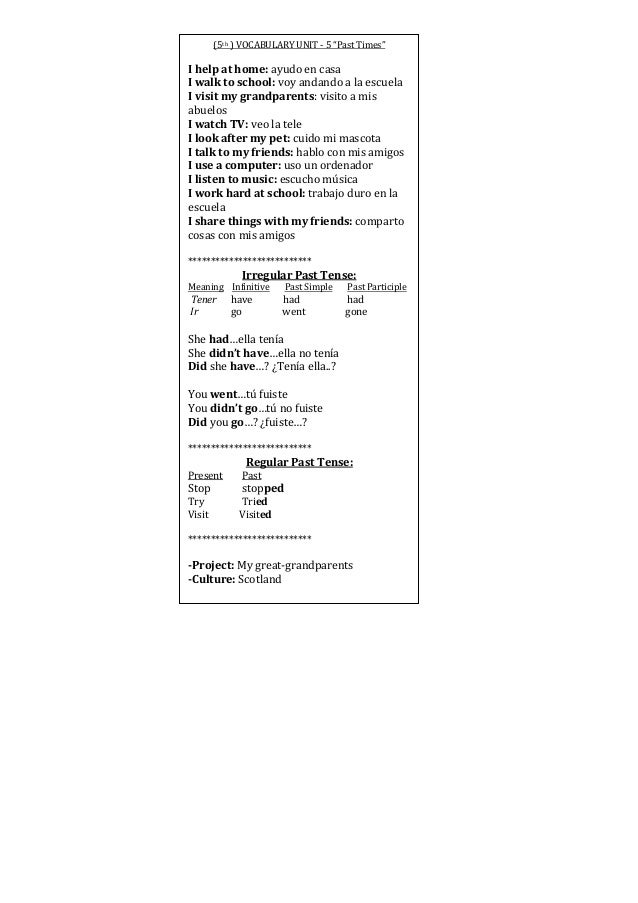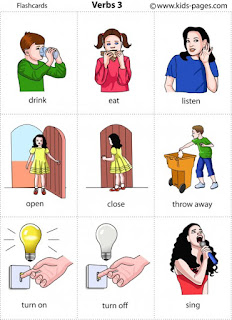1. THEY ARE SMALL, ROUND AND SWEET. THEY'RE GREEN, RED OR PURPLE.
2. IT'S A VEGETABLE WITH GREEN LEAVES AND A BIG WHITE HEAD.
3. THEY'RE SMALL, ROUND AND SWEET. THEY'RE OFTEN TWO TOGETHER. THEY CAN BE BLACK OR RED.
4. YOU CAN COOK IT OR EAT RAW IN SALAD. YOU CAN ALSO ----- SOME GREEN, YELLOW AND ORANGE.
5. IT'S BIG AND OVAL, BROWN AND YELLOW AND IT'S GOT SPIKY GREEN LEAVES AT THE TOP.
6.IT'S GREEN OR BLACK AND THE SAME SHAPE AS A PEAR.
7. THEY'RE ROUND OR OVAL AND SWEETS. THEY ARE BIGGER THAN CHERRIES. THEY'RE GREEN, YELLOW, RED OR PURPLE.
8. IT'S GOT DARK GREEN LEAVES, YOU CAN COOK IT OR EAT IT RAW IN SALAD.
9. IT'S A VEGETABLE. IT'S GOT A PURPLE SKIN AND IT'S WHITE INSIDE.
10. THEY'RE SMALL, ROUND, SWEET AND RED. THEY GROW ON A BUSH.
martes, 9 de abril de 2019
miércoles, 27 de febrero de 2019
martes, 22 de enero de 2019
UNIT 4- REVIEW
UNIT 4
REVIEW:
1. WRITE IN NEGATIVE AND INTERROGATIVE THE FOLLOWING SENTENCES.
- There was a beautiful animal.
- They study English once a week.
- My mum cooks very well.
- We have got a good Maths teacher.
- My brothers are my best friends.
- That man was the robber.
- Last year I was very ill.
2. VOCABULARY:
- Decepcionada. / - Preocupado / - Feliz / - Traviesa/ - Tranquila/ - Inquieto, ruidosa.
- SHE WAS NAUGHTY
- WE WERE SHY
- HE WASN'T EASY TO PLEASE
- MY LITTLE BROTHER WAS NOISY
3. COMPLETE THE DESCRIPTIONS ABOUT JOBS
- A CHEF IS A ___________________________________
- A SCIENTIST _____________________________________
- A TEACHER ___________________________________
- A JOURNALIST _______________________________________
- AN ACTOR ______________________________________________
- A POLITICIAN __________________________________________
4. Put the verb "to be" into the simple present or the simple past:
REVIEW:
1. WRITE IN NEGATIVE AND INTERROGATIVE THE FOLLOWING SENTENCES.
- There was a beautiful animal.
- They study English once a week.
- My mum cooks very well.
- We have got a good Maths teacher.
- My brothers are my best friends.
- That man was the robber.
- Last year I was very ill.
2. VOCABULARY:
- Decepcionada. / - Preocupado / - Feliz / - Traviesa/ - Tranquila/ - Inquieto, ruidosa.
- SHE WAS NAUGHTY
- WE WERE SHY
- HE WASN'T EASY TO PLEASE
- MY LITTLE BROTHER WAS NOISY
3. COMPLETE THE DESCRIPTIONS ABOUT JOBS
- A CHEF IS A ___________________________________
- A SCIENTIST _____________________________________
- A TEACHER ___________________________________
- A JOURNALIST _______________________________________
- AN ACTOR ______________________________________________
- A POLITICIAN __________________________________________
4. Put the verb "to be" into the simple present or the simple past:
- I an engineer.
- Last year I a student in Massachusetts Institute of Technology.
- I in love with a beautiful girl at that time.We friends
- Now, I live in New York and I married to her.
- I in Canada last summer holiday.
- My sister with me.
- We in Montreal.
- She very happy.
- I happy, too.
Read the sentence. Circle the correct answer.
He _________________ sick yesterday.
were / was / weren’t
b.
I _________________ in the school play last year.
were / was / is
c.
_________________ you on the bus this afternoon?
Was / Were / Where
d.
I _________________ late for school today, I was early.
wasn’t / weren’t / were
e.
They _________________ happy with the football score.
weren’t / wasn’t / we’re not
lunes, 14 de enero de 2019
NEW YEAR, NEW UNIT
WE HAVE JUST STARTED A NEX UNIT, FOR IT YOU CAN START TO PRACTICE

http://www.myenglishpages.com/site_php_files/grammar-lesson-simple-present-be.php
http://www.grammar.cl/Past/To_Be.htm
martes, 8 de enero de 2019
Dictation and more exercises
Here you can check your dictation. Don't worry if it is not well. You can do it better if you practice.
1. This person reads the news and presents on TV.
2. This person is a professional cook.
3. This person works in politics and the government.
4. This person has original ideas and makes new things.
5. This person sings, plays an instrument and writes music.
6. This person acts in films.
7. This person writes the news, the newspapers and websites.
8. This person works in science.
9. This person builds houses and other buildings.
10. This person plays basketball.
MORE ACTIVITIES IF YOU WANT TO IMPROVE YOUR VOCABULARY ABOUT JOBS.
1. This is a person who acts in a movie or plays
http://learnenglishteens.britishcouncil.org/grammar-vocabulary/vocabulary-exercises/jobs
1. This person reads the news and presents on TV.
2. This person is a professional cook.
3. This person works in politics and the government.
4. This person has original ideas and makes new things.
5. This person sings, plays an instrument and writes music.
6. This person acts in films.
7. This person writes the news, the newspapers and websites.
8. This person works in science.
9. This person builds houses and other buildings.
10. This person plays basketball.
MORE ACTIVITIES IF YOU WANT TO IMPROVE YOUR VOCABULARY ABOUT JOBS.
Read the following statements and complete them with their correct occupations.
2. This is a person that assists patients
3. This is a person who helps doctors with their work.
4. This person bakes cakes and bread
5. This person cleans schools, banks, hospitals, etc.
6. He or she cooks at the restaurant.
7. This person delivers pizzas, and other kind of fast food.
8. This person designs buildings.
9. He or she teachers subjects at school.
10. He or she drives a taxi.
11. He or she files documents at the library.
12. this person flies an airplane.
13. This person grows vegetables.
14. He guards buildings.
Matching the statements in Column A with their corresponding occupations in Column B.
Column A Column B
-
He/she manages a restaurant or hotel 1. salesperson
-
This person writes and edits newspapers 2. supervisor
-
This person paints buildings and houses 3. Translator
-
He / she plays some instruments 4. Manager
-
He or she fixes cars, buses, etc. 5. Cashier
-
He or she repairs things at home 6. Journalist - Reporter
-
This person sells cars, clothes, shoes, etc 7. Waitress
-
His / her job is to supervise people 8. Repairperson
-
He or she takes care of elderly people 9. Waiter
-
He/she translates from one language to another one 10. Painter
-
This person uses a cash register at his/her work 11. Health care aide
-
He services food at the restaurant 12. Musician
-
She services food at the restaurant 13. Veterinarian
-
This person is a doctor for animals 14. Mechanic
-
He or she gives haircuts and shaves 15. Barber
Suscribirse a:
Comentarios (Atom)








